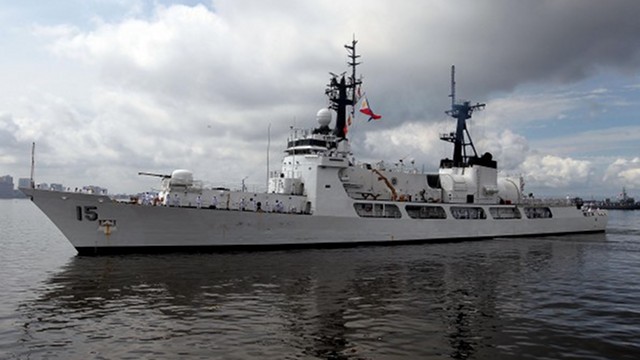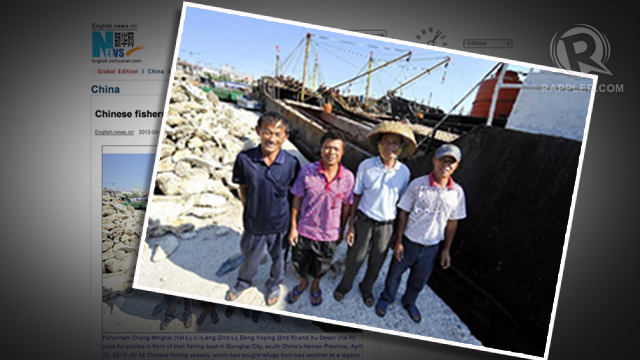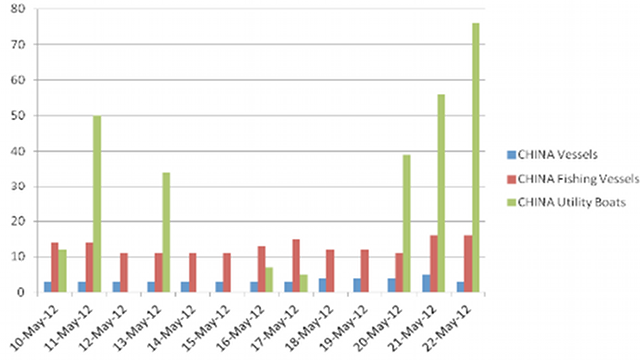SUMMARY
This is AI generated summarization, which may have errors. For context, always refer to the full article.
MANILA, Philippines – For 8 Chinese fishing boats, the Philippines sent its biggest warship.
This, said a Singapore-based public policy expert, was the Philippines’ fundamental “mistake” in the Scarborough Shoal dispute that erupted in April. The Philippine Navy then sent its flagship, the former US Hamilton-class cutter BRP Gregorio del Pilar.
“First, you sent out a message that you’re ready to fight; you sent a warship. Second, you handled it as an international dispute,” said Huang Jing, professor at the National University of Singapore’s Center on Asia and Globalization.
Huang spoke Friday, July 20, in a forum at the University of the Philippines titled “The Rise of China and the US Asia Pivot: Implications for the Philippines, Asean, and the West Philippine Sea Dispute.”

Philippine Navy chief Vice Admiral Alexander Pama had said BRP Gregorio del Pilar was initially meant to go to Poro Point, La Union to prepare for North Korea’s rocket launch before the standoff began. The ship, however, was diverted to Scarborough Shoal after authorities spotted the Chinese vessels.
For its part, China sent two maritime patrol ships, which are civilian in nature.
“China also sent two messages,” Huang said. “The first message, ‘I’m trying to do it peacefully.’ The second message – that is more fundamental – ‘These are internal affairs, so I’m going to send my civilian police force.’”
This is because China wants to prove its “peaceful rise.” “China has always said that it follows a strategy of peaceful rise – and indeed China’s rise has been peaceful… This is a test. Will this global power still remain peaceful?” he said.

The Philippines, eventually, pulled out BRP Gregorio del Pilar and had Coast Guard vessels – civilian ships – to conduct surveillance instead.
‘Best’ in response
Following this was a series of commitments between the Philippines and China to deescalate the tension in Scarborough Shoal.
Eventually, the two countries supposedly promised to pull out their ships from the shoal’s lagoon. The Philippines claimed China broke this commitment, while China asserted there was no such promise in the first place.

Other analysts have criticized China over its attitude in the dispute.
In a recent forum organized by the Center for Strategic and International Studies (CSIS), Southeast Asian security expert Carlyle Thayer hit China’s “dismissive” attitude.
“It’s the best country in the world to respond to an incident. As soon as an incident occurs anywhere, China’s never to blame. The other side’s lying, mendacious, they made it up, or within 24 hours, we can tell you, it’s just normal Chinese jurisdiction activities. They’ve never once conceded that there may be hothead, rogues, or miscalculation by someone out there… that they need to investigate and look at,” Thayer said.
For others, China should join the Philippines in bringing the Scarborough Shoal dispute before an international court. China, however, has repeatedly rejected the Philippines’ invitations to do so, because “internationalizing this issue will only complicate and magnify the situation.”
US support?
Meanwhile, Huang cautioned Filipinos against depending too much on US aid in South China Sea issues. This, despite the 1951 Philippine-US Mutual Defense Treaty that states: “Each party recognizes that an armed attack in the Pacific area on either of the parties would be dangerous to its own peace and safety, and declares that it would act to meet the common dangers in accordance with its constitutional process.”
“If China dares to attack the Philippines, the United States will have no choice but to come to your defense,” Huang said. But if it happens in the South China Sea, “it’s not really covered by the treaty.”
The MDT limits its coverage to armed attacks “on the metropolitan territory of either of the parties, or on the island territories under its jurisdiction in the Pacific, or on its armed forces, public vessels, or aircraft in the Pacific.” (Read the MDT below.)
Huang noted the US has made it clear it will not take sides in South China Sea disputes. Much less would US go into war with China given the latter’s growing economic and military might, according to Huang.
“If you are (US President Barack) Obama right now, do you want a war in the South China Sea? The answer is, that will be a nightmare for him,” Huang said. “He cannot send troops to fight the Chinese. But if he does not do that, he will be grilled alive by people like (Mitt) Romney.”
When President Benigno Aquino III visited the US in June, however, what US President Barack Obama did was pledge freedom of navigation in the South China Sea.
Nevertheless, the ongoing dispute has produced “very good” effects for the Philippines, said Southeast Asian analyst Zachary Abuza in an interview on Rappler’s Talk Thursday. (Watch video below.)
He said the Philippines, for one, has recognized the importance of broading alliances with the US and the rest of the Southeast Asian region. – Rappler.com
Related stories:
- Aquino’s softened tone on Scarborough
- China’s aggression ‘very good’ for PH
- Scarborough Shoal in the eyes of Filipino-Chinese
- Why China calls it Huangyan Island
- Scarborough Shoal according to Manila, Beijing
Add a comment
How does this make you feel?
There are no comments yet. Add your comment to start the conversation.